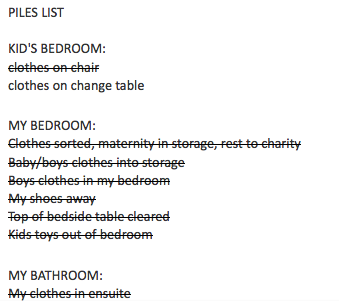Many powerful emotions are lurking amid stuff we keep. Whether it’s piles of unread newspapers, clothes that don’t fit, outdated electronics…the things we accumulate reflect some of our deepest thoughts and feelings.
To come to grips with their clutter, clients need to understand [and confront] why they save what they save, or things will inevitably pile up again.”
– The Psychology of Clutter, by Melinda Beck, Wall Street Journal
On Monday Tip wrote a post on letting go, explaining how real letting go can only happen if we first understand our relationship with stuff.
…and like magic into our inbox popped this video and article on The Psychology of Clutter by Melinda Beck for the Wall Street Journal.
“There’s growing realization amongst professional organizers that the first step towards de-cluttering is when we have to take in our heads coming to grips with why we keep what we keep.”
Remember, stuff only becomes clutter when it goes beyond stuff and causes us to feel a host of unpleasant / negative emotions: stressed, overwhelmed, anxious, paralyzed…and not be able to deal with it.
“Difficulty letting go of your stuff can also go hand in hand with separation anxiety, compulsive shopping, perfectionism, procrastination and body-image issues. And the reluctance to cope can create a vicious cycle of avoidance, anxiety and guilt.”
Avoidance? Anxiety? Guilt?
Yup! Yup! Yup!
To come to grips with their clutter, clients need to understand [and confront] why they save what they save, or things will inevitably pile up again.”
Which brings us back to why we need to understand our relationship with stuff and those ‘piles’ of clutter lying around.
I had a client recently who literally said “I know all the tricks like start with a corner, but I always go between perfectionist tidy and then cluttered piles…how do I know I wont go back there, back to clutter?”…I explained, “that’s because you haven’t confronted and really looked at why you’re doing this in the first place. Let’s deal with that first, and then you’ll see…we’re not going back we’re only going forward to new habits and ways you want to live by. Then next time the first pile starts you have a different way to handle it. But first, let’s have an honest look…”
So we did. Over a Skype call.
The next day she cleaned two piles and found $750 (from rebates she found in one pile and sale of something in another pile) and had already changed the bedroom. Two weeks later all the piles of clutter (17 of them) were gone from her house and while there are still things to tackle – a whole storage room in fact – “it feels different now”… and what’s best is that every time she writes to me she says “I still feel amazing”.
This isn’t magic, although for my client and others like her who deal with why they’re keeping stuff it does feel like it.
At the heart of our process with our clients – one on one coaching or our courses – is first understanding why you keep things and your relationship with stuff…
So that when you remove things you are really letting go.
Not just of the things this time, but of the reasons too.
It really is the only way to create new habits and ways that are happier, healthier, less stressful and overwhelming and well, work for you!
Because really, I know you don’t want to feel overwhelmed and paralyzed by stuff.
So go, what are you waiting for? Read Tip’s latest blog post on why we keep stuff and confront why you keep stuff…
and if you are ready for a new way and want some gentle guidance to get you there, contact us and let’s schedule a time to work on it together, once and for all.

Pingbacks